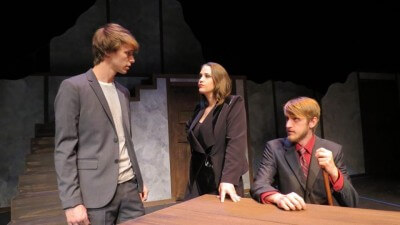By BRUCE COLLIER

Northwest Florida State College (NWFSC) professor/director/designer Clint Mahle has been having some experimental seasons, theatrically speaking. The college theatre department dove back into the 1970s last fall with a revival of Feiffer’s People, a risky endeavor both for its off-center “Me Decade” humor and its open-space performance style.
The frontiers have been further extended this year, with the world premiere of Mahle’s original play The Third Side, written under his nom de plume, James Clinton. The two act mystery-drama opens this week, running March 16 – 19, at 7:30 p.m. nightly.
The hero of the play is Christopher Marlowe, one of English literature’s most enigmatic figures. He was a contemporary of William Shakespeare, wrote a handful of plays that enjoyed success both popular and critical success, and was likely a part-time spy against the European Catholics for Queen Elizabeth. He died young, stabbed to death at a boarding house, ostensibly in a quarrel over the bill. Or was it an assassination?
Clinton’s program notes bear reading. It is no criticism to say that the play requires a little preparation. The cast of characters is a laundry list of the Elizabethan arts and political community. Among the persons represented are Queen Elizabeth, her boy-toy Lord Essex, adventurer Sir Walter Raleigh, theatre-men Edward Alleyn and Phillip Henslowe, spy master Sir Francis Walsingham, and a pesky young journeyman playwright known simply as “Bill.” The actors, with the exception of Jesse Hartsog as Marlowe, play various characters via costume changes. My knowledge of Elizabethan England comes mostly from Shakespeare notes and watching a lot of “Masterpiece Theatre” in the ’70s and ’80s. I was ransacking my memory to keep the teams and players straight. The notes will set things up nicely.
The stage and staging taps into Elizabethan simplicity, a bare-bones space with doors, a staircase and balcony, with rooms and areas created by swift scene-shifters. Lighting and sound are unobtrusive, costumes modern-day. As with Shakespeare’s (and Marlowe’s) plays, there are many scenes, many locations, and the spoken word is sovereign.
Yes, the actors talk a lot. They talk about art, science, faith, doubt, ambition, and the precarious human condition. Over the years of our acquaintance I have often heard Clinton say that Elizabethan audiences referred to theatre-going as “hearing a play.” As your kindergarten teacher used to say, you will need your listening ears. The plot is complex and sometimes seems to twist and double back. But the actors keep it moving, fiercely engaging with each other – and sometimes addressing the audience – as if their lives depended on figuring it all out.
Overall, the actors’ performances are strong and fully committed, their transitions from character to character cleanly delineated. As Marlowe, Hartsog physically conjures up a young David Bowie (minus the cultivated weirdness), and walks the fine line between earnest and sardonic. I never thought of Marlowe as a likable person, but Hartsog transcends the “university wit” and shows us a guy who ultimately values people over abstract ideas.
Tara Sindelar evokes both cat and serpent as the ambitious, amoral Poley, Walsingham’s protege who covets – and collects – all the marbles. Sheila Johnson has an amusing cameo as a bemused, romantically besotted Queen Elizabeth. James Meadows and Zach Phillips are a perfectly matched pair as Alleyn and Henslowe, trying to stay alive and solvent in the Elizabethan theatre minefield.
The full-scale staging of an original script is a rarity in this area – most don’t get more than a simple staged reading. Projects like The Third Side are exactly what college theatre departments are intended – and ought – to be doing, and should be encouraged.
It’s not a breezy, lightweight evening, but if you keep your wits about you and leave yourself open to a new experience, you just might acquire the taste.
Tickets for The Third Side are $15 for adults and $10 for youth ages 18 and younger. Tickets may be purchased online through the Mattie Kelly Arts Center website at www.MattieKellyArtsCenter.org. Box Office phone and in-person hours are 10 a.m. to 4 p.m. Monday to Friday and 90 minutes prior to any show scheduled in the Sprint Theater.
